11 Careers to Land With Lean Six Sigma Green Belt Training Bootcamp
Whether software development or IT services, every sector benefits from certified quality management professionals. That’s because quality is a crucial attribute in the development of every product or service in the contemporary marketplace. Lean Six Sigma in the IT industry is an extensively used data-driven technique for streamlining business processes and increasing customer satisfaction.
Lean Six Sigma is a highly valued skill by employers, and the demand for Lean Six Sigma certified professionals is at its peak. This article covers Lean Six Sigma career paths and the best Lean Six Sigma Green Belt careers you can choose for your professional journey.
Let’s start by diving into the Lean Six Sigma fundamentals.
Significance of Lean Six Sigma in the Present Hiring Market
Lean Six Sigma is a fact-based and data-driven technique for achieving operational excellence that prioritizes defect prevention over defect detection. The main idea behind Lean Six Sigma in IT companies is to provide a designed set of tools and techniques for identifying the root cause of errors, eliminating discrepancies, and minimizing variations.
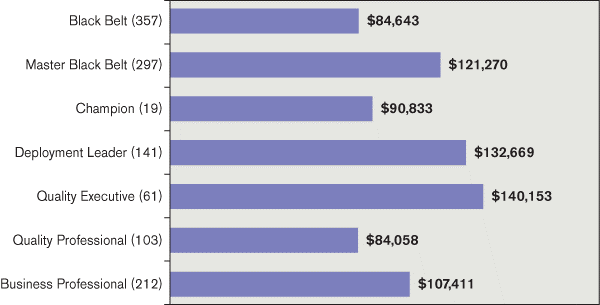
Source: GreyCampus
The unexpected benefits of Lean Six Sigma for an organization include:
- Lean Six Sigma tools help manage time effectively and track interruptions if there are any.
- Lean Six Sigma helps reduce the cycle time by up to 35% to ensure optimal results and timely delivery.
- Lean Six Sigma helps supply chain management by using tools like DMAIC (Define, Measure, Analyze, Improve, Control).
- Lean Six Sigma helps an organization analyze the customer’s perspective on a product, leading to a higher level of customer satisfaction.
- Lean Six Sigma maximizes the organizational benefits by continuously working on quality improvement.
Job Market Scenario for Lean Six Sigma Certified Professionals
Employers hire Lean Six Sigma certified professionals because they have process improvement techniques and expertise, which are highly valuable for the advancement of business processes. The Lean Six Sigma principles are universally applicable across all industries, and this is why Lean Six Sigma certified professionals are highly valued.

Source: SlideShare
Lean Six Sigma certification holders can apply for any and every job requiring relevant expertise as these jobs aren’t industry-specific.
What Is Lean Six Sigma Green Belt Certification?
Lean Six Sigma Green Belt certifications are advised when you want to climb the corporate ladder. A Lean Six Sigma Green Belt certification holder operates under a Lean Six Sigma Black Belt professional. Their responsibility entails analyzing and solving quality issues.
Lean Six Sigma Green Belt certification training allows you to stay ahead in the marketplace. The GreyCampus Lean Six Sigma course equips you with the ability to lead teams by implementing the relevant tools and methodologies for mentoring and communicating with team members effectively.
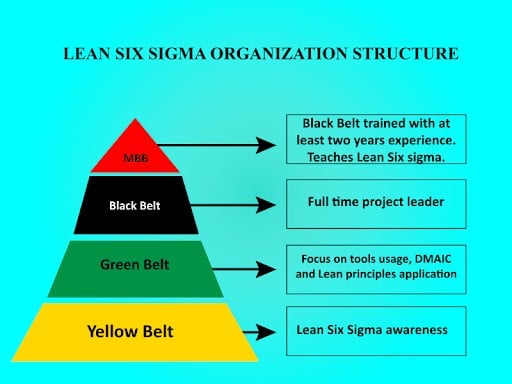
Source: Investopedia
Lean Six Sigma Green Belt holders are mostly involved in quality improvement projects. The primary role and responsibility of Lean Six Sigma for IT professionals involves offering solutions to processing problems and analyzing current business processes to determine where waste can be eliminated to minimize costs.
Who is Lean Six Sigma Green Belt certification for?
Lean Six Sigma Green Belt certification is relevant for professionals who are either leading complex quality improvement projects in part-time roles or catering to such projects as integral team members.
The eligibility criteria of Lean Six Sigma for IT professionals include:

Lean Six Sigma Yellow Belt ----------------- No work experience required
Lean Six Sigma Green Belt ----------------- 3 years full-time
Lean Six Sigma Black Belt ----------------- 3 years full-time or completion of 2 or more Lean Six Sigma projects
11 Careers You Can Land With a Lean Six Sigma Green Belt Certification
Lean Six Sigma Green Belt certification helps you get lucrative quality management career opportunities. The Green Belt level of Lean Six Sigma upskills you to deal with complex process management or process manufacturing issues in organizations.
There are numerous job opportunities for Lean Six Sigma Green Belt certified individuals. If you are wondering why you require Lean Six Sigma certification in the IT industry, it is because it sets you apart from non-certified candidates competing for roles requiring advanced process management expertise.
Lean Six Sigma Green Belt holders can opt for higher-level certifications if they want to advance into executive leadership roles.
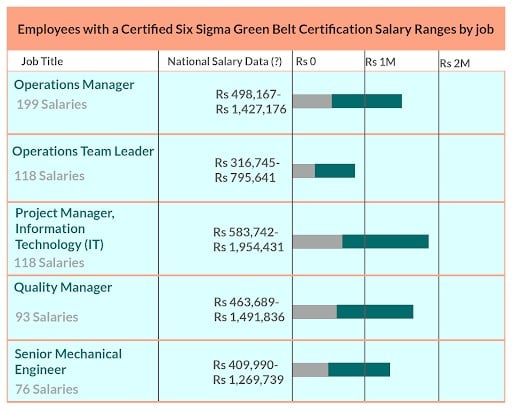
Source: GreyCampus
The demand for Lean Six Sigma Green Belt jobs can be seen on job portals/boards where most of the job vacancies are from companies looking to hire these experts.
Globally renowned organizations such as Volkswagen, UnitedHealth Group, GE, TCS, Honeywell, IBM, Genpact, and Accenture are in a constant search for Lean Six Sigma Green Belt holders.
Let’s explore the 11 best Lean Six Sigma Green Belt jobs that are most in-demand.
1. Operating System Specialist
An operating system specialist job falls under the broader umbrella of software developers. Their primary responsibilities include:
- Facilitate and maintain security clearance.
- Make sure that there’s disciplined continuous improvement within the team by facilitating employee training and running continuous improvement workshops for improving the quality and deliverables.
- Act as a change agent by cultivating relationships for driving continuous improvement among various business units.
- Develop multi-site continuous improvement strategies for optimizing the operating systems.
- Create responsive and flexible work cells with the one-piece flow.
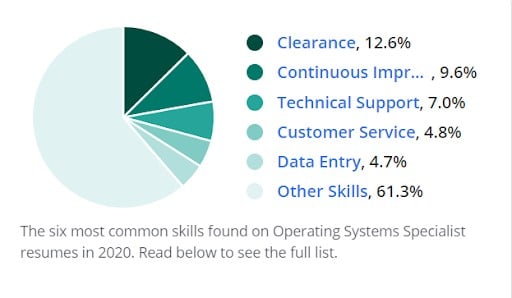
Source: Zippia
2. Lead Manufacturing Engineer
The primary task of a lead manufacturing engineer is to cost out designing for existing product lines and support new product development and introduction by implementing sound engineering principles and processes. This position requires individuals to have thorough expertise to operate in a new product development environment.
A lead manufacturing engineer is one of the most popular Lean Six Sigma certification jobs. These individuals have to facilitate continuous improvement of productivity by leveraging various tools, including design for Lean Six Sigma for monitoring performance, recommending key engineering metrics, and suggesting process improvements.
The salary of lead manufacturing engineering roles is quite lucrative, and these positions are in demand.
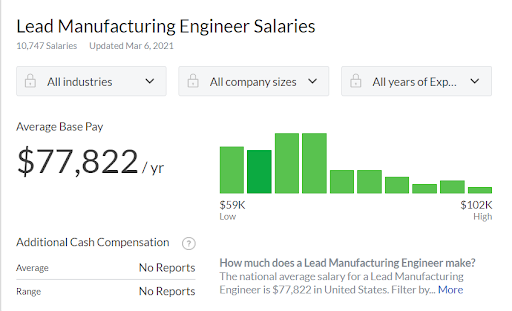
Source: GlassDoor
3. Lean Six Sigma Consultant
A Lean Six Sigma consultant is a professional who is not only trained in Lean Six Sigma, or its principles, but also helps other organizations in implementing Lean Six Sigma methodologies to streamline business processes.
Companies hire Lean Six Sigma consultants because these professionals are completely unbiased about any challenges these organizations might face and bring a fresh perspective to the table. Also, Lean Six Sigma consultants are in high demand as they are experts in implementing Lean Six Sigma principles in various businesses.
The fees of independent Lean Six Sigma consultants depend on the clients and the complexity of the project. Experienced Lean Six Sigma consultants charge between $2000 and $4000 per day, excluding miscellaneous expenses.
4. Process Development Engineer
A process development engineer primarily designs and develops processes to optimize process flow, enhances operating capabilities, minimizes variabilities in business processes, and ensures workers’ safety.
The main objective of process development engineers is to identify, develop, verify, and validate business processes from the initial development stages to final implementation. Process development engineers evaluate and analyze current business processes and offer useful recommendations, as and where required.
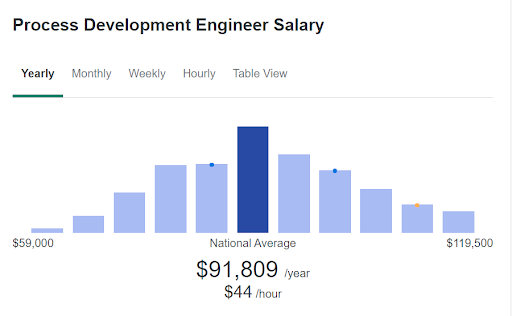
Source: ZipRecruiter
Process development engineers also train entry-level engineers and help in designing, maintaining, and validating business processes. They ensure that the processes are aligned with specific business goals and measure processes against corporate objectives.
The average annual salary of process development engineers is $91,809, and most of their time is spent working with process control equipment and machinery, drafting systems, and computers.
5. Data Scientist
Data scientists primarily work with massive amounts of data, and their key responsibilities include gathering and analyzing large sets of structured and unstructured data.
A data scientist's work revolves around making sense of raw and unstructured data that comes from various sources, such as social media feeds, smart devices, emails, etc.

Source: Dezyre
These professionals analyze, process, and model data and finally interpret the outcomes for creating actionable plans for companies. Knowledge of computer science, statistics, and mathematics are essential for becoming a data scientist. Finance and insurance, professional services, and manufacturing are the three top-paying industries for data scientists.
Experienced data scientists work cross-functionally with other teams, such as customer success, marketing, and operations to help organizations in cleaning, processing, and storing data seamlessly.
6. Project Engineer
The key responsibility of a project engineer is to manage engineering or technical projects by functioning in harmony with stakeholders at all levels and looking after budgeting, personnel, and project planning.

Source: SalaryExplorer
Project engineers ensure the safety of the projects by minimizing the potential risks involved. A project engineer acts as a coordinating figure when dealing with stakeholders across all areas of the projects to interpret their specific requirements, expectations, and limitations, and putting these in front of the team to facilitate successful project delivery.
The maximum average annual salary of a project engineer in the US is $135,000.
7. Warehouse Operations Manager
A warehouse operations manager develops warehouse operation systems by identifying storage and product handling requirements. Plus, these professionals work on developing, enforcing, evaluating, and implementing warehouse operations procedures and policies.
The average annual salary of a warehouse operations manager is $60,816.
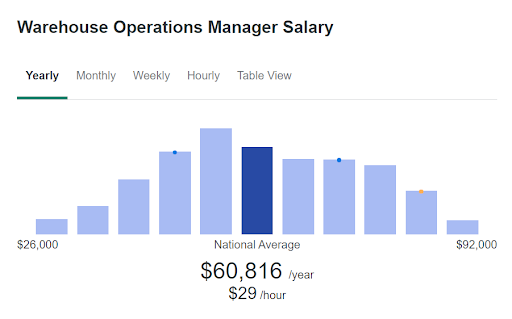
Source: ZipRecruiter
Other major tasks of a warehouse operations manager include receiving and storing products by designing and developing product movement, optimizing warehouse operations, and handling staff.
8. Compliance Structural Engineer
The key responsibilities of a compliance structural engineer are to ensure that various products meet safety standards. They educate team members as well as clients about compliance requirements. They communicate with staff members across all levels to ensure that compliance requirements are in place and submit regulatory paperwork.

Source: ZipRecruiter
Compliance structural engineers cross-function between various departments and keep them up to date on new or revised compliance regulations. The average annual salary of these professionals is $83,194.
9. Reliability Engineer
A reliability engineer plays a vital role in the lifecycle of a product. Their role and responsibility is to monitor the assessment and management of the reliability of operations that could affect product or business processes. They do this by identifying and managing asset reliability risks.

Source: Indeed
Three crucial responsibilities of engineers are risk management, lifecycle asset management, and loss elimination. This is usually applicable to manufacturing or engineering businesses that require ensuring that their processes and equipment can deliver expected outcomes seamlessly.
Reliability engineers’ average annual salary is $100,590.
10. Business Process Analyst
The key role of a business process analyst is to help senior management professionals facilitate strategy execution by streamlining and reengineering current business processes, designing new business models, and offering support to change management.

Source: ZipRecruiter
Business process analysts identify areas where businesses can enhance their processes and optimize workflows to stay ahead of the curve in their industry. These professionals earn approximately $85,431 annually.
11. Senior Project Manager
A senior project manager is the head of any project whose primary responsibility is to plan, organize, lead, and control projects seamlessly. This role requires individuals to have extraordinary and in-depth knowledge of project management.

Source: ZipRecruiter
Senior project managers must be well-versed in coaching and mentoring team members effectively, establishing realistic goals, identifying trends, building and implementing best practices for the successful delivery of projects, evaluating projects, and more. These professionals earn $130,906, on an average annual basis.
The Final Word
The career opportunities for Lean Six Sigma Green Belt certification holders are endless. Professionals with a Lean Six Sigma Green Belt certification can pursue managerial and senior-level roles in various departments, such as IT operations, project management, change production, business development, and so on.
GreyCampus is a leading provider of Lean Six Sigma Green Belt training. By enrolling in this course you can become eligible for advanced certifications and a rewarding career that opens doors to professional success.
Want To Get Lean Six Sigma Green Belt Certified? Sign Up for a Bootcamp Now!